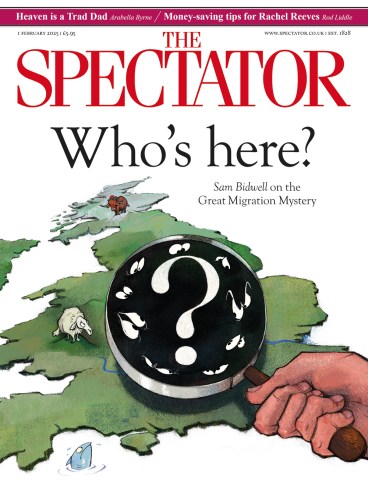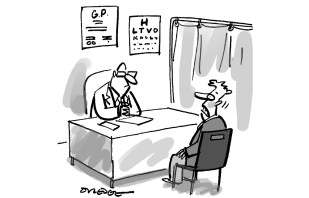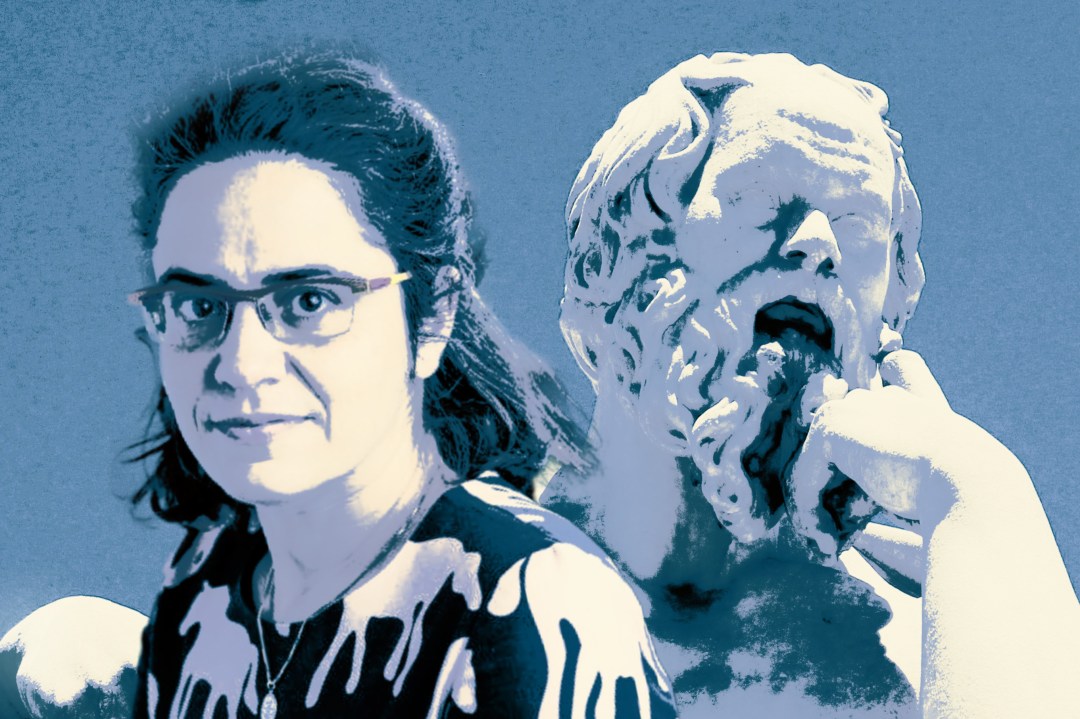
Angus Colwell has narrated this article for you to listen to.
Agnes Callard is a professor of philosophy at the University of Chicago and she lives with her current husband and her ex-husband. At the same time, yes. They raised the kids together as well (two from her first marriage, now 21 and 16, then one from her second, now 11).
I mention this not as gossip, but because her approach to her marriage is an example of how she lives philosophically. Her latest book, Open Socrates: The Case for a Philosophical Life, is an argument about how we shouldn’t take cultural norms and rote-learned advice for granted. Instead, we need to talk with others, regularly, about the reasons for our actions.
Callard was born into a Jewish family in Budapest in 1976, but grew up mostly in New York. She has taught at Chicago since 2008 and has become as much of a public philosopher as you can be in an age where their stock is low. Her first book, Aspiration, is about how people grow into who they want to be. Yet she’s also known for her provocative essays, especially one that made ‘the case against travel’ (‘Learn how to do nothing!’ she argues).
Her fame beyond academia came two years ago, when the New Yorker published a profile about her marriage. In 2011 she was a married woman, teaching in Chicago, and was handing out end-of-term cookies to her students. Arnold (27-year-old grad student) looked at Agnes (35-year-old teacher) weirdly as he ate the cookie. ‘I think I’m a little bit in love with you,’ he said. ‘I think I’m in love with you too,’ she replied. They had a cigarette out of the window and the next day she decided to divorce her husband, Ben.
Ben agreed that they should get a divorce. Initially they lived apart and shared custody of the children, but when Agnes became pregnant, she and Arnold moved back into Ben’s apartment so the children from the first marriage didn’t have to travel between homes. Agnes and Ben say they saw no reason why they shouldn’t live as a three. Ben even gave the toast at the rehearsal dinner for Agnes and Arnold’s wedding.
‘The way we did that was to think it through together,’ she tells me when we meet at The Spectator offices. I ask her whether her life changed much following the New Yorker profile. ‘It didn’t hit me that much,’ she says. ‘Though it may be that my life changed in ways I didn’t notice. Some people maybe liked me less. Maybe there are things I didn’t get invited to.’
Her love life is unorthodox, but that’s not surprising when you hear her view of most modern relationships: ‘The company of the person one once chased with restless abandon loses its thrill. The frequency of both sex and intense conversation decreases, and living together becomes a matter of routine. Even the good case is far from ideal.’ She says that we should rage against the cliché of passionate romance fading into sterile companionship: ‘I think it’s why a lot of people fear marriage.’
When she was struggling with her own marriage, she weighed up the effect her divorce would have on her children against the act of living dishonourably. ‘I thought it was going to be devastating for my children,’ she says. ‘I thought I was traumatising them. And I was like, “Yeah, I’m going to do it anyway.” Like, they’re going to be hurt, you know? That’s the way life is. I’m going to help them through it, and, like, life is hard… [but] that turned out to be wrong. As a matter of fact, my children were not traumatised. The third one [Arnold’s son] is glad he exists, and the first two are very glad to have Arnold, who from their point of view has the role of a father to them. And they think they’re lucky to have an extra parent.’
For Callard, philosophy isn’t just her job, or an intellectual exercise. She wants it to be what it was intended as by Socrates: a guide to living a good life. Socrates is the inspiration behind her book. ‘He was a shock to the system,’ she says. ‘He was the kind of guy you can’t forget.’ What he did was, through discussion, ‘find his way to the sore point of a person’s identity. So if that person is a general, he might end up asking them, “What is courage?”’ Through the Socratic dialogue, we will better understand our actions.

The main premise of her book is that philosophy can only be effective as a social activity. Studies have borne this out: talking to someone else should be harder than giving a monologue, but we tend to find it easier. ‘You respond to stuff that I say in two-tenths of a second, which is faster than your brain can process the signal from the end of when I speak,’ she says. ‘What’s happening is you’re predicting when I’m going to talk next and you’re able to do it even though we don’t know each other.’ Scientists have suggested that this means we’re actually meant to think, in some way, by conversing.
‘We can’t look for answers by ourselves,’ she says. ‘[We are] not going to see our blind spots. That is when we sit by ourselves in a room, and affirm what we already think. The worst echo chamber in the world is your own mind. Another person is an escape valve.’
The three topics she focuses on in the book are no less significant than politics, love and death. As I read it, trying to imagine my friends and I plumbing the depths of our minds together, I felt insanely conscious that I’m not American. The British tradition against over-thinking and over-sharing runs deep. There’s Dr Johnson kicking the stone, or the self-absorbed Mr Prendergast in Decline and Fall, preoccupied with his ‘doubts’ about God. The phrase ‘ignorance is bliss’ – characteristically English – comes from a poem about Eton.
‘I thought I was traumatising my children. And I was like, “Yeah, I’m going to do it anyway”’
Callard rejects the comforts of not knowing. She thinks we should look life and death in the eye, and confront what Philip Larkin described as that which ‘stands plain as a wardrobe, what we know, have always known, know that we can’t escape’. She tells me about the example of Tolstoy. ‘In some ways, the most successful human being who ever lived… He was amazing from a really young age. He’d written War and Peace and Anna Karenina, [and then] he has this crisis where he’s like, “My life has no meaning”… and you’re just like, “Wait, Tolstoy can say that?”.’
Tolstoy had his crisis of meaning when he was 50. He wrote that: ‘If an enchantress had come and offered to fulfil my desires for me, I wouldn’t have known what to say.’ Callard says that midlife breakdowns aren’t so rare, and that many of us are primed to snap. ‘I think a lot of people either hit that crisis or they feel like it’s waiting in the wings for them,’ she says. ‘Maybe the richer we get, the more luxurious our lives get, the more free time we have, the greater the chances that we’re not going to be able to hold that crisis at bay.’
Callard believes that if we make a habit of interrogating ourselves and our beliefs, we can lessen the chances of an unforeseen breakdown. But does that mean I’m a failure if I don’t live philosophically? ‘I think many people think that about themselves. And in a way, I’m speaking to that. I think that a lot of people in the corner of their eye see this thing that they’re not doing that they kind of feel they should be doing. They can’t put a name to it.’
Yet Callard isn’t entirely dismissive of the value of the British stiff upper lip. ‘Philosophy requires a little bit of emotional suppression,’ she says. ‘You have to tell yourself to chill and to not get defensive and not have emotional reactions… Before this interview started, I could feel certain emotions coming up in me. I was ready to be a bit defensive. And I had to tell myself, “Chill, that’s not going to help you. It’s not going to help you to think about answers to questions”.’
Socrates said that the prospect of an eternity of enquiring, of asking questions, was an ‘extraordinary happiness’. It’s a daunting idea to most of us, rooting around to see what’s there, poring over our lives with our friends and opening ourselves up to discomfort and fear. But perhaps the relentless struggle for knowledge will open up a better way. Perhaps it will even be fun. As with Sisyphus and his boulder, one must imagine Agnes Callard happy.









Comments